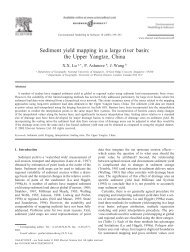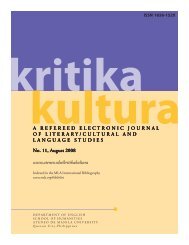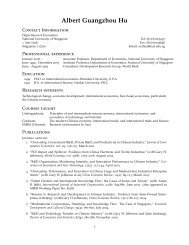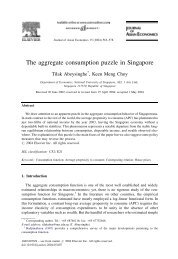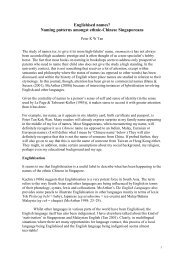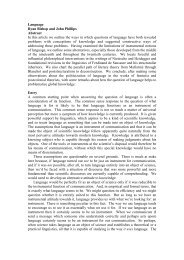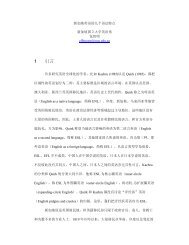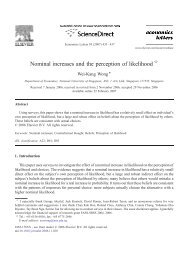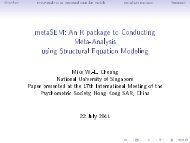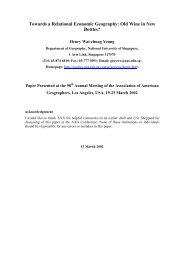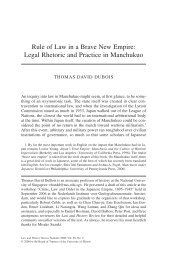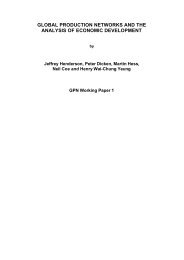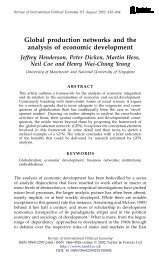Researching Hybridity in Social and Economic ... - NUS Home
Researching Hybridity in Social and Economic ... - NUS Home
Researching Hybridity in Social and Economic ... - NUS Home
You also want an ePaper? Increase the reach of your titles
YUMPU automatically turns print PDFs into web optimized ePapers that Google loves.
<strong>Research<strong>in</strong>g</strong> <strong>Hybridity</strong> <strong>in</strong> <strong>Social</strong> <strong>and</strong> <strong>Economic</strong><br />
Geography: The Case of ‘Ch<strong>in</strong>ese’ Bus<strong>in</strong>ess Networks<br />
Abstract<br />
The concept hybridity has posed a very significant methodological challenge to our practice<br />
as social <strong>and</strong> economic geographers. While economic organizations are <strong>in</strong>creas<strong>in</strong>gly<br />
hybridized through such non-economic forces as social embeddedness <strong>and</strong> cultural identities,<br />
conventional methods <strong>and</strong> techniques <strong>in</strong> social <strong>and</strong> economic geography seem to fail to<br />
capture this process of hybridization <strong>and</strong> its complex geographies. In this reflexive paper, I<br />
am to discuss how a process-based methodology <strong>in</strong>corporat<strong>in</strong>g some elements of actornetwork<br />
analysis may contribute to resolv<strong>in</strong>g this complicated issue of research<strong>in</strong>g <strong>in</strong>to the<br />
hybridity of economic organizations. Reflect<strong>in</strong>g on my own experience of research<strong>in</strong>g<br />
Ch<strong>in</strong>ese capitalism, I show how this process-based methodology is useful <strong>in</strong> unravel<strong>in</strong>g the<br />
complex <strong>and</strong> often secretive nature of the spatial organization of Ch<strong>in</strong>ese family firms <strong>and</strong><br />
their bus<strong>in</strong>ess networks <strong>in</strong> East <strong>and</strong> Southeast Asia. The cultural identities <strong>and</strong> spatiality of<br />
key actors <strong>in</strong> these Ch<strong>in</strong>ese bus<strong>in</strong>ess networks are <strong>in</strong>creas<strong>in</strong>gly heterogeneous such that it<br />
becomes rather difficult to identify purely “Ch<strong>in</strong>ese” actors <strong>in</strong> today’s globaliz<strong>in</strong>g era. As<br />
such, the emergence of a new hybrid form of “Ch<strong>in</strong>ese” bus<strong>in</strong>ess networks entails a<br />
reconsideration of our exist<strong>in</strong>g research methods <strong>and</strong> practices. In so do<strong>in</strong>g, I also exam<strong>in</strong>e the<br />
wider issue about the politics <strong>and</strong> practice of research<strong>in</strong>g hybridity <strong>in</strong> social <strong>and</strong> economic<br />
geography.<br />
Reflect<strong>in</strong>g on the culturalist perspective of Ch<strong>in</strong>ese capitalism<br />
In this paper, I aim to reflect critically on my own posititonality <strong>in</strong> research<strong>in</strong>g<br />
hybridity <strong>in</strong> Ch<strong>in</strong>ese bus<strong>in</strong>ess networks <strong>and</strong> to problematize methodologically Ch<strong>in</strong>ese<br />
capitalism research. This methodological paper is <strong>in</strong>tentionally reflexive <strong>and</strong> is thus peculiar<br />
to my own experience of research<strong>in</strong>g Ch<strong>in</strong>ese capitalism. Ch<strong>in</strong>ese capitalism can be def<strong>in</strong>ed<br />
as a historically- <strong>and</strong> geographically-specific form of economic organization among ethnic<br />
Ch<strong>in</strong>ese liv<strong>in</strong>g outside ma<strong>in</strong>l<strong>and</strong> Ch<strong>in</strong>a, particularly <strong>in</strong> East <strong>and</strong> Southeast Asia. It is a<br />
dom<strong>in</strong>ant mode of economic organization <strong>in</strong> East <strong>and</strong> Southeast Asia because of not only its<br />
economic significance <strong>in</strong> the host economies, but also its complex <strong>and</strong>, yet, <strong>in</strong>tricate social<br />
organization <strong>and</strong> authority systems (see Yeung, 2004a). To put the logic of my presentation<br />
upfront, I will show how my methodological approach to research<strong>in</strong>g Ch<strong>in</strong>ese capitalism has<br />
shifted over the years from a static culturalist one to a dynamic transformative perspective.<br />
2



